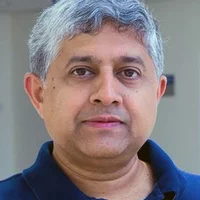Our research group is interested in understanding the mechano-genomics of cellular ageing and how ageing cells and ageing related disease cells, such as cancer and fibrotic cells, can be reprogrammed and rejuvenated by mechanotransduction. Towards this, we also develop novel imaging-AI based mechano-genomic biomarkers as fingerprints for cells health and disease.
MGG research summary
Recent studies have highlighted that cellular ageing is accompanied with the loss of mechanical integrity of cells, which may result in a progressive decline of cellular organelle functions as well as loss of tissue integrity and onset of various diseases including cancer, fibrosis, and neurodegeneration. A major challenge going forward is to understand the underlying mechanisms of cellular ageing and develop robust methods to rejuvenate ageing cells. In recent years our group has made significant contributions towards an in-depth understanding of the mechano-genomic mechanisms underlying the coupling between the extra-cellular matrix, 3D chromatin organization, and gene expression that is critical to understand cellular ageing, develop methods to rejuvenate ageing cells and implement imaging-AI based chromatin biomarkers for cell-fate decisions. Our results also provide novel avenues to explore the mechano-genomic coupling between cellular ageing, reprogramming and cancer within the tissue microenvironment. Pursuing these avenues has been our priority in research, education, and technology and knowledge transfer.
Our group’s research program is highly interdisciplinary and uses advanced light microscopy, microfabrication, functional genomics, theoretical modeling, and machine learning methods. Importantly, our research program has also drawn in domain experts in mechanobiology, genomics, bioengineering, theoretical physics, computer science and clinicians. Building on our current strengths, our ongoing and future research is focused on three major themes:
- Regulation of genome organization and gene expression by nuclear mechanotransduction during cellular ageing
- Mechano-genomic regulatory modules in cellular reprogramming and rejuvenation
- Single-cell imaging-AI based chromatin biomarkers for cellular ageing and cancer
Clinical trials: On the medical side, in collaboration with the Center for Proton Therapy at PSI, we have started a clinical trial to analyze if our imaging-AI based chromatin biomarkers of peripheral mononuclear blood cells, obtained from liquid biopsies, could help determine the efficacy and toxicity of proton radiation therapy for treating various cancers in human patients. In addition, together with the local Health Center in Brugg, Switzerland, we have started a clinical trial to assess if our chromatin biomarkers could provide robust methods for early cancer diagnostics. We plan to expand on these ongoing successful clinical trials in future.
Chromatin Imaging Atlas of Blood Cells in Human Cancers - A Public Health Project. We propose to develop a comprehensive chromatin imaging atlas of peripheral blood mononuclear cells (PBMCs) in aging related human diseases. We will use light microscopy combined with AI methods to characterize the subtle alterations in chromatin structure associated with different aging related diseases. Such an imaging atlas will provide new avenues for early diagnostics and tracking of therapeutic interventions.
Technology transfer: Our research program on mechano-genomics has also resulted in the founding of a company “FOCAL Biosciences” together with Apollo Ventures and PSI/ETH Zurich. The goal of this company is to identify lead compounds for cellular reprogramming in the context of ageing related diseases. FOCAL Biosciences aims to use our group’s knowhow to develop a drug discovery platform using the “mechano-genomic principles underlying fibroblast cell-state transitions and the imaging-AI based chromatin biomarkers”.
Outreach
Mechano-Genomics Seminar Series
From September 2020 to April 2024 we were running the "Mechano-Genomics Seminar Series" on Zoom, to highlight the latest developments in this emerging area.
EMBO Workshop on Nuclear Mechano-Genomics
In collaboration with Marco Foiani (IFOM - The FIRC Institute of Molecular Oncology, IT) and Caroline Uhler ( Massachusetts Institute of Technology, US), G.V. Shivashankar was organizing the 2024 EMBO workshop on Nuclear Mechanogenomics,
Open positions
In our projects, we have multiple openings for PhD students and postdoctoral fellows with a strong background in molecular and cell biology, genomics, bioengineering, advanced light microscopy/image analysis and computational biology. >>> More Information (FDF)
Senior Scientists associated with the MGG group:
Celestino Padeste is a Chemist specializing on polymer brushes and biointerfaces, and engaged in the development and fabrication of supports for protein crystallography. Currently, he is initiating collaborations with the Mechano-Genomics Group to develop single-cell 3D engineered wells combined with microfluidics for Nuclear Mechanobiology.
Philipp Berger is a Cell Biologist specializing on receptor mediated cell signaling mechanisms. Outside of his main research program, he is initiating collaborations with the Mechano-Genomics Group to develop multi-color labelling strategies for Nuclear Mechanotransduction.
Soichiro Tsujino is a Physicist currently working on the application of acoustic levitation for protein crystallography. Outside of his main research program, he is initiating collaborations with the Mechano-Genomics Group to develop ultrasound based methods to analyze Nuclear Mechanical Homeostasis.

